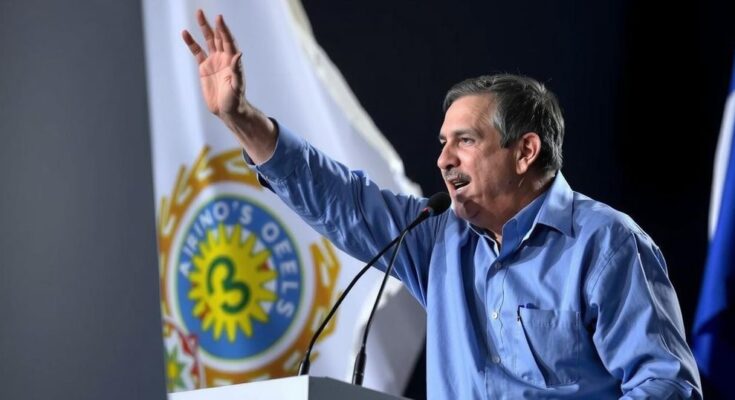Uruguay’s conservative government has conceded defeat in the presidential run-off to left-wing candidate Yamandu Orsi of the Broad Front. Alvaro Delgado acknowledged the loss after a competitive election, with Orsi now set to lead amidst a global trend of political upheaval. Voter turnout was high, and Orsi’s moderate approach promises a blend of market-friendly policies and social reforms for the future.
In a significant political shift, Uruguay’s governing party has conceded the presidential run-off election to left-wing candidate Yamandu Orsi. This concession marks the end of the center-right coalition that took power in 2020. Alvaro Delgado, the ruling coalition’s candidate, expressed his regret but acknowledged Orsi’s victory, stating, “with sadness, but without guilt, we can congratulate the winner.” With over 57% of the votes counted at the time of announcement, Orsi of the Broad Front is set to assume the presidency, continuing the trend of leftist leadership in Uruguay that has been characterized by progressive social policies.
The election saw robust voter engagement, with a turnout of 89.4% as ballots closed. Following a competitive first round, Orsi, a former history teacher, garnered approximately 49% of the vote compared to Delgado’s nearly 46%. This election aligns with a global trend of voters expressing dissatisfaction with incumbent governments in the wake of economic challenges exacerbated by the pandemic. However, Orsi is recognized for his moderate stance, aligning with several key policies favored by his predecessor, reflecting continuity rather than upheaval in governance.
Uruguay has a rich history of progressive reforms under the Broad Front, which included the legalization of abortion, same-sex marriage, and marijuana sales during their previous tenure. As Orsi prepares to lead, he aims to reinforce these policies while also addressing pressing issues such as childhood poverty and organized crime through market-friendly policies. Notably, he seeks to implement tax incentives to attract investment without imposing drastic changes to the economic framework.
The election outcomes emphasize the electorate’s pursuit of stability and progress, as citizens look to improve their quality of life moving forward. For many, Orsi represents hope for enhanced social conditions, as expressed by voter Yeny Varone, who highlighted the importance of better working environments for future generations.
This transitional moment in Uruguayan politics signals both a return to leftist governance after a brief conservative term and indicates a potential ongoing evolution of policies aimed at balancing economic growth with social welfare.
The recent presidential run-off in Uruguay illustrates a politically transitional moment for the nation, as the leftist Broad Front regains leadership after a five-year conservative administration. Historically, the Broad Front was lauded for implementing progressive reforms, whereas the recent conservative coalition faced challenges following a pandemic-related economic downturn. This election is reflective of a wider global trend where voters express frustration with incumbent parties, a sentiment echoed in various regions worldwide during this pivotal election year.
The concession by Uruguay’s governing party reveals a significant political shift as Yamandu Orsi of the Broad Front emerges as the new president, ending a brief period of conservative governance. The election highlights key issues pertinent to voters, such as social welfare and economic stability, while reflecting a global tendency to challenge incumbent governments. As Uruguay embarks on this new political phase, the emphasis will be on continuity in policies alongside the aspiration for economic and social improvements for its citizens.
Original Source: www.shropshirestar.com




